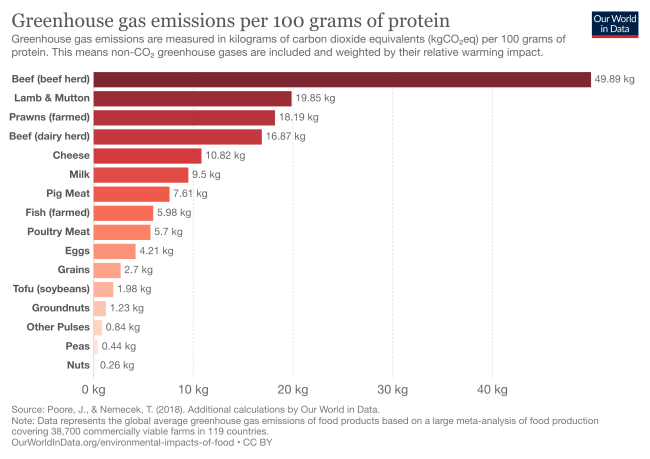Maybe you are striving a meatless diet regime, or merely couldn’t locate ground beef at the store in the final few months. Maybe it was appreciate at very first chunk when you attempted a plant-primarily based burger at a nearby restaurant, and you had to go get your possess patties. What ever the circumstance, Americans are consuming extra meat alternate options than ever just before.
Much more specifically, plant-primarily based alternate options are suffering from an uptick in sales that started off even just before the coronavirus pandemic hit. But in March, sales of meat alternate options jumped one more 264 per cent — not only due to level of popularity, but an enhance in distribution as properly.
In the meantime, stories of COVID-19 spreading via meat processing plants have induced some to briefly close their doorways. As of June eight, over seven,one hundred Tyson Meals workforce had analyzed favourable for the novel coronavirus. The provide chain has been stunted in some places, leaving farmers with a surplus of animals all set for slaughter, and no decision but to eliminate and dispose of them.
So, is this fake meat’s significant break? The higher sales fees glimpse promising, and the items could support retain shelves complete when beef and turkey burgers are very low in inventory. But food market authorities these as Mark Lang, an associate advertising professor at the University of Tampa, say this after-in-a-lifetime established of instances very likely will not lead to the regular human being to totally give up on meat.
“Meat eaters are however the premier aspect of the population,” he suggests. A 2018 Gallup poll identified that only 5 per cent of grownup Americans detect as vegetarians — a one-per cent drop from a preceding poll in 1999. But that doesn’t necessarily mean meat eaters are not prepared to compromise. Instead, plant-primarily based meat organizations may have to locate much better methods to meet up with their likely prospects in the middle alternatively of encouraging them to give up animal items entirely.
A Nutritious Alternate?
Meat substitutes can arrive from quite a few plant-primarily based resources — soy, jackfruit, beans or fungi, to title a few. In the circumstances of makes like Extremely hard Meals or Over and above Meat, patties get made from textured soy proteins and are made to glimpse like their animal-sourced counterparts. Still, the term “plant-based” may be deceptive in conditions of wellbeing added benefits: In conditions of nutritional contents, processed meat alternate options genuinely are not a lot much better for the body than traditional meats.
Taking in a really processed, plant-primarily based burger will have about the identical saturated fat and protein articles as a ground beef or turkey burger. But they’ll have bigger amounts of sodium and reduced amounts of cholesterol. And simply because they are really processed, the plant-primarily based alternate options lack the nutritional improve that their uncooked ingredients, like soybeans, can give.
But not like meat output, which final results in great outputs of greenhouses gases, plant-primarily based alternate options have been demonstrated to be a lot easier on the ecosystem. About fourteen.5 per cent of all human-manufactured greenhouse gasoline emissions comes from animal agriculture, many thanks in aspect to the methane manufactured by ruminant animals these as cattle. A 2019 examine in Science identified that dairy farms emitting the smallest amounts of greenhouse gases however established 36 periods extra air pollution than the regular farm that manufactured peas.

(Credit: OurWorldinData.org)
Even the items that emit the smallest amounts of greenhouse gases, these as poultry and eggs, however exceed emissions from all vegetable items. And inspite of beef’s hefty impacts on the ecosystem, it basically contributes a quite little amount of money to our dietary intakes — only 37 per cent of total protein usage and eighteen per cent of total energy.
Assisting the ecosystem is a central aspect of the advertising for Over and above Meat and Extremely hard Meals. Each organizations say generating a favourable affect on climate transform is a central aspect of their mission. But even nevertheless this target would appear to be normally pleasing to any climate-acutely aware shopper, Americans are not constantly the very best at placing Earth very first on their record of priorities when it comes to choosing what they consume — even if they do treatment about the ecosystem.
Feeding the Masses
Meat is a deeply rooted aspect of American culture, and it is not easy to get men and women to completely transform their ingesting behavior, even if it is touted as a move for the increased great.
“People can leap on and off diets, and they do all the time,” Lang suggests. “But being on a modified diet regime is genuinely difficult for men and women to do, specifically when things are framed as ‘you have to give this up,’” as it frequently is in the circumstance of meat alternate options.
Instead, Lang suggests, having shoppers to lessen their meat usage in get to suppress climate transform may well require a compromise. Enter the blended burger — a combine of meat and greens ground into a patty developed to glimpse just like its all-beef counterparts.
In a January report in the journal Foods Quality and Desire, Lang surveyed 602 American grownups on their impressions of a burger made of a beef-and-mushroom blend. The respondents have been asked to rank their good reasons for striving the burger primarily based on things these as taste, wellbeing added benefits, environmental sustainability, selling price and novelty. Most respondents rated wellbeing added benefits as their top purpose for striving the burgers. But, to Lang’s surprise, environmental sustainability was final on most respondents’ lists.
“[People] may say ‘I’m striving to support the Earth and improve my diet regime at the identical time,’” he points out. “But when they are forced to make trade-offs, it is genuinely, ‘I want to improve my diet regime and my wellbeing, and if I can preserve the ecosystem, that is great, way too.” To Lang, that is the significant breakthrough — that your possess wellbeing comes very first when choosing foodstuff, then the increased great of the ecosystem. And if it calls for way too terrific of a sacrifice, then you may opt for an a lot easier decision.
Potential Meat
Lang suspects the era of fake meat is however quite a lot in its early levels, inspite of the existing higher sales of plant-primarily based alternate options. Appropriate now, existing advertising tries to sway prospects to make a “switch” to plant burgers, which could alienate some shoppers who are not gung-ho about giving up meat completely.
“This receives framed in the media as an all-or-nothing at all proposition: It is either meat or no meat,” Lang suggests. He acknowledges that reducing meat usage in the regular American’s diet regime is however an important move to suppress climate transform, but could very likely be finished in lesser increments. Plant and meat blends could be the bridge to a extra sustainable diet regime — letting prospects to get pleasure from a product or service with a lesser quantity of meat, and, hence, a lesser carbon footprint.
“We’re finding out that men and women want things to be easy, easy and little,” Lang suggests. “People have a quite difficult time generating considerable or drastic variations to their diet regime and their ingesting behavior.”
As for the soy patties at your nearby grocery: They very likely will not be flying off the shelves like bratwurst on the Fourth of July. But over time, we could see items marketed extra to meat-loving Americans who want to insert extra plants to their diet regime, while however getting acutely aware of their carbon footprint.




